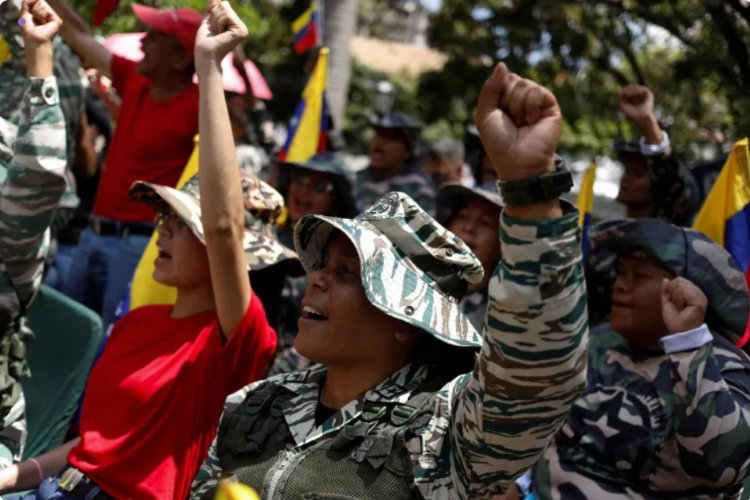(Al Jazeera Media Network) Venezuela on Tuesday announced what it called a major nationwide military deployment in response to the presence of growing United States naval forces off its coast.
On Thursday, the US also unveiled an operation, called Southern Spear, which it said was intended to target “narco-terrorists” in the Western Hemisphere.
The escalation has raised alarm in Caracas, where officials worry the US may be using these operations as a pretext to force President Nicolas Maduro out of power.
“We tell the American empire not to dare; we are prepared,” Foreign Minister Yvan Gil said on Thursday at an event in Caracas.
But is Venezuela really prepared for a US attack or invasion? What are its military capabilities? And what might be the calculus driving the decisions of US President Donald Trump and Maduro, respectively?
Tensions between Washington and Caracas have been spiralling for weeks, as the Trump administration has hit a series of boats in the Caribbean Sea and, more recently, the Pacific Ocean, claiming they were carrying individuals smuggling narcotics into the US.
The 20th strike took place this week, US officials have said. In all, about 80 people have been killed. The Trump administration has not presented any evidence to back its assertion that the bombed boats had narcotics or drug smugglers on them, or that the vessels were even headed to the US. It has also not offered any legal justification for its actions, which many experts believe violate international law.
At the centre of Washington’s allegations is an unsubstantiated claim that Venezuela’s Maduro is driving the narcotics smuggling to the US in cahoots with cartels.
Meanwhile, the US has dispatched the USS Gerald R Ford carrier strike group into Caribbean and Latin American waters, a powerful naval formation built around the world’s most advanced and largest aircraft carrier.
An aircraft carrier is a floating airbase – a warship that can launch, land, refuel, and arm military aircraft at sea.
The Ford is a nuclear-powered supercarrier equipped with advanced technology, sailing alongside guided-missile destroyers and support ships, with more than 4,000 personnel and dozens of tactical aircraft ready for rapid deployment.
As Washington expands its military presence in the region, analysts say the stated goals of the mission have broadened and may not fully align with the capabilities of the forces being deployed.
“The administration has said that the deployment is to stop the flow of illegal drugs to the US, and also to degrade the cartels, but over time the US goal has expanded to include anti-Maduro regime activities,” said Mark Cancian, senior adviser in the defence and security program at the Center for Strategic and International Studies (CSIS), in an analysis posted on X early on Friday.
Cancian noted that the carrier may not be fully optimised for the mission as described. “The Ford is not well suited for counter-drug operations… It’s well suited to attack adversaries either at sea or on land.”
He also pointed out that the deployment of the Ford cannot be indefinite.
“There are demands around the world for its presence because it’s such a powerful military asset, and eventually it’ll have to go home – so Southern Command will need to either use it or stand down,” he said, referring to the US military command under which the Caribbean and the Pacific Ocean fall.
On Tuesday, Venezuela’s government announced a “massive” mobilisation of troops and civilians to prepare for any potential US action.
Venezuelan Defence Minister Vladimir Padrino Lopez announced a “higher phase” of the Independence Plan 200, a military response mechanism ordered in September to strengthen defence measures against the US presence in the Caribbean.
“Nearly 200,000 troops have been deployed throughout the national territory for this exercise,” Padrino Lopez added.
The exercise was scheduled to start Tuesday and end on Wednesday.
Padrino Lopez also stressed that the country’s military forces were united. He said “more than 90 percent of the people reject any aggression against Venezuela,” dismissing opposition groups he described as “minority, subversive, [and] fascist”, and claiming they “no longer exist” in the national political landscape.
He framed the mobilisation as part of a broader stand against “imperialist aggression” and Washington’s attempts to act as “the world’s hegemon” and “the world’s police”, insisting that Venezuela remains committed to its independence, liberty and sovereignty.


